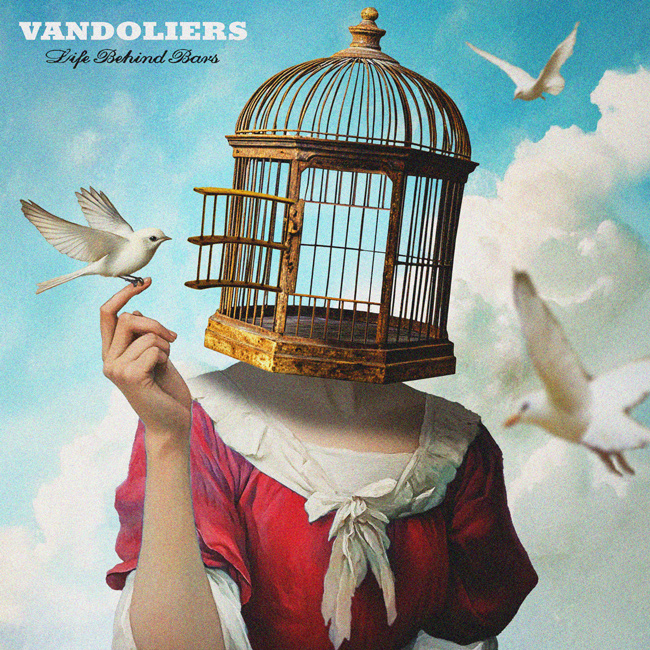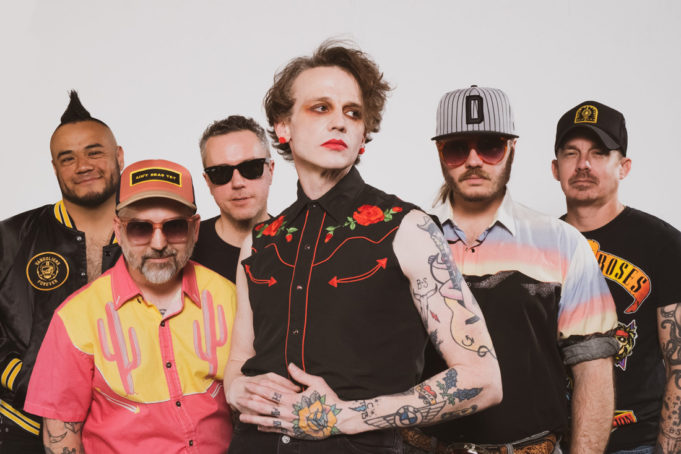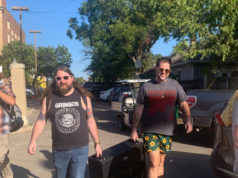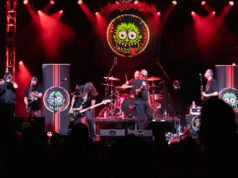The Vandoliers welcome change. In their 10 years as a band, they’ve transitioned from Fort Worth to Dallas, from local success to national acclaim, and now, on the eve of the release of the cowpunk group’s fifth album, Life Behind Bars, a transition no one saw coming: Frontperson Joshua Fleming is now trans woman Jenni Rose. Well, not exactly no one. A little publication called Rolling Stone recently came a-calling, and just like the Weekly, they dialed an 817 number to reach her.
For this interview, I enlisted the help of my husband, Greg Spicoli, an avid local music advocate with a background in broadcasting who’s done a ton of artist interviews. There’s a lot to unpack. — Jennifer Bovee
Fort Worth Weekly: Your last local Vandoliers show was with The Toadies at Billy Bob’s in December, and, wow, there’s been a lot to unpack since then, right? You’ve been up to a lot.
Jenni Rose: I was up to it then, too. I just didn’t know it. The wheels were turning. The band had already known. Backstage, I was Jenni. Onstage, I wasn’t.
You’re coming up on your fifth album. Why go the album route in an era when bands are really not doing many albums anymore?
We make records because I write a lot of songs, and other people write songs (or I write songs with other people), and I end up finding these awesome tunes, and then I get excited about them, and I want to put them down. I’m also a producer. I went to school for that and love being in the studio, so I use our albums as a way to learn. This time, I had the opportunity to work with Grammy Award-winning producer Ted Hutt, who has produced many of my favorite records, including Flogging Molly’s Drunken Lullabies [and Lucero’s 1732 Overton Park]. You know, these are massive records for me and in my life.
Life Behind Bars is coming out on Fri, Jun 27. This album art is something right out of a Salvador Dali painting. The title, Life Behind Bars, can be interpreted in many ways. It states that the Vandoliers are now a touring band that no longer has to play in bars. “Behind bars” could also mean jail time. Is someone in legal trouble?
You know, all of it, all of it. No, I wrote the title song with Corey Graves, who plays trumpet and piano, Joshua Ray Walker, and John Pedego. We did it right before we went to record at Sonic Ranch [in Tornillo, Texas]. Before we left, I had a co-writing session with Josh, who has always wanted to write a song with Corey. We just started talking about life behind bars, which is one of the lines we had written. And then John asked me how I was doing.
I hadn’t come out yet. I hadn’t told anybody what I was going through. I’m in the leadership position, and my band was white-knuckling through all of this. And I was just like, “Man, I feel like I’m on the edge of oblivion.” That was the first line. Everybody added lines, but every time I had one, I threw in what I was dealing with. By the end of it, we had the song, and it was just kind of malleable and relatable. I guess everybody feels trapped sometimes, right? You feel like you can’t escape the situation. Even if the door is completely unlocked, which it always is, you still feel trapped. I think that’s just kind of the sentiment of the song, like, whether you’re a band on the run or a bartender or in jail, or you’re a trans girl with gender dysphoria, you know, I think it all applies.
On the two tracks available right now before the album comes out, I’m not hearing a lot of the cowpunk-forward attitude that I’m used to hearing on your previous records. Is there going to be any of that? Or is the band transitioning as well into a more mature sound for the Vandoliers?
It’s definitely a more mature sound on the record. But there is a song called “Jim Sparring” that’s a cowpunk song with trumpets, fiddles, and the whole bit. I feel like we’ve made those songs, though, and you gotta grow. I wasn’t in Dallas, Fort Worth, or Memphis, where we recorded before. I was at Sonic Ranch, in a magical, multimillion-dollar studio located next to a beach house, for this one. There was a pecan orchard, a desert, a sunset, and a lot of battling inward. Many of the songs are introspective. This album is probably my most serious work, as cliche as that sounds. I’m just going through a lot of shit, and this is my outlet. It’s the beginning stages of me opening up. “Dead Canary” is very much about my dysphoria. “Life Behind Bars,” my portion of it, is about changing and missing someone and changing and being away. “Bible Belt” is about the indoctrination that I felt and the alienation that I felt as a closeted trans woman.

Courtesy Vandoliers
You’re going in deep about the indoctrination that we all experienced growing up in North Texas. You had some of it, too?
Yeah, you got it. It’s probably one of the songs I’m the most afraid of. If we weren’t already such an outspoken band and were pandering to the country music machine, I feel like that song would get us “Dixie Chick-ed,” but we’re not, so hats off to us.
When I saw your show with The Toadies back in December, I had just heard about your protest performance in Tennessee the day they signed that anti-drag bill. Hats off to you for that. Now, you’ve just recently come out as trans. How does it feel? Are you doing well, and do you feel like a boulder has been lifted off your chest, so to speak?
I’ve known for a while. I’ve spent a lifetime denying it and the last two years trying to hide it while also trying to alleviate the pressure. First, I was honest with my family and then with my band and team. Every time I opened up to someone about it, I felt better, and our relationship with each other became more vivid, open, and transparent. That happened slowly over a year. Now that the Rolling Stone article has hit, I am vivid with a mass amount of people. Outside of the fears of violence and harassment and then just being an outwardly visible trans woman, I feel great. When somebody’s talking to me, they’re really talking to the person. They’re seeing the person inside from the outside, whereas before, I wouldn’t have shown this to anybody.
Before, I felt like there was a disconnect because I wasn’t fully present for other people. I was at arm’s length. I would be kind or nice, but I wouldn’t let you really get to know me. I wouldn’t really let you in. And then, all while doing that, I was destroying myself at any point in time possible with drugs and alcohol. Once I got sober and started changing my life, this was something I had to confront with the people who were close to me, and I healed my relationships within my circle by facing it and being accepted. Now, I am fixing my relationship with the world. This is who I am. Like, this is what I’ve been dealing with. This is what my journey looks like. This is me being completely open and honest about what I’ve been going through, the things I didn’t tell you about, and the reason why you might have thought, “Why is this person so weird?” Or, “Why are they so standoffish?” These questions may have lingered after our previous interactions. Now, I don’t have to do that shit. I can just be me.
Were the drugs and alcohol a coping mechanism, or was it just the party getting out of hand?
I think it’s all of it. I think the party was the base level, a way to dissociate from my inner feelings. And I used that from my early teenage years into my 30s. That’s a long bit of time. By the end of it, it wasn’t really a party anymore. It was really a shame, and once I got through that, nothing really had much control over me. Those who are struggling with addictions and substance abuse are really struggling more internally than externally. I know that it manifests externally, but what I was going through was very internal. I was trying to hide it. I was trying to project it onto other people so that they wouldn’t look at me, and I tried to deny it up to a point, but then it just got too heavy. It got too hard, and I just couldn’t anymore. I was going crazy. And so I came out to one person: my wife. Then, I couldn’t put it back in the bottle, and I had to come out to my best friend. Then, I had to keep coming out, one step at a time. And then the Rolling Stone article was published. There were so many people I didn’t get a chance to talk to before it came out. Some of them I wanted to talk to. Some of them I did not.
For the Weekly readers who may be unfamiliar with trans issues, what can they do to become more accepting and learn more about them? Some people will be strongly against the trans community just because they were told to be via religious indoctrination, even though they don’t really know why.
Figure out your own feelings, and ask yourself, “Are these feelings or facts?” With feelings, were you told to feel this way, or is it because of an interaction or an experience? If it’s because you were told to feel that way, then it’s very likely those feelings are not based on reality. Within the queer community, and within the trans community specifically, we are being dehumanized. If the feelings come from an experience, try to remember that empathy is real and is something to hone and practice.
I might be the first trans person in someone’s life. Thus, I am a human interaction that many people have had, especially in Fort Worth, some good, some bad. Now, people have to decide, well, do I still like this person in spite of them being trans, because they’re trans, or do I even give a fuck that they’re trans at all, you know? Or do I hate them because they’re trans? I would love to give people a reason to see the humanity in a trans woman. Billionaires are spending millions and millions of dollars on advertising a narrative that trans people are dangerous and against women’s rights, you know, when in reality, we’re kind of the crux of human rights. If I’m not allowed to express my spiritual self and identity, then what freedom do we really have?
Has there been any backlash from loved ones or fans?
No, everything’s been cool. Everybody’s like, Yeah, whatever. I mean, not that I’ve seen, and if there was, it was quickly deleted and blocked, or I didn’t catch it, or it was at such a low vibration, it didn’t fucking matter. The Vandoliers have pruned our fan base. Any respectable country music aficionado knows that we opened for Bernie Sanders in 2019 and we were the first band to go against the drag bill in Tennessee. The fans have had plenty of reasons to check out our views on issues over the years. However, we are susceptible to new hate. Hopefully, articles like this one won’t bring that out, but if it does help soften hearts — and it does allow a little humanity to seep into a conservative space — I can take it. When they see someone transitioning and realize that it’s not hurting anybody, then maybe that spell can be weakened a little bit.
You’ve got a side project that played recently at Denton Pride at Rubber Gloves. Who are the Tom Girls?
I just needed a palette cleanse, so I wrote a pop-punk record in October before I came out to my band. I was scared that the Vandoliers might kick me out and I would need to find another band. I was really fucking worried. Again, feelings aren’t facts, but I had a lot of fears not based on reality. I was also afraid my wife would leave me, not because she gave me any reason to believe that but just because I do have an inherent fear and shame that I’m really working through every time I come out to someone.
But let’s say I did come out to you, and let’s say you did accept me, and you were added to my inner circle … you would receive a private SoundCloud link with the Tom Girls demo record “Sissy,” and that would be my little gift basket to the people that I came out to. I’d be like, “Hey, I’m trans.” And they’d be like, “Oh, cool. I love you.” I’d be like, “Sweet. Here’s a pop-punk record.” I wrote this, not knowing if anyone else would ever hear it, but then, we played a show in Austin. People showed up, like a lot of people did, and then they really liked it.
And any parting words?
Trans rights are human rights.
The Vandoliers’ next shows are in August at Kessler Theater (1230 W Davis St, Dallas, 214-272-8346, Sat 8/16) and in July at Gruene Hall (1281 Gruene Rd, New Braunfels 830-629-5077, Sat 7/19), where Jenni Rose will be the first trans woman to headline that historic venue.












